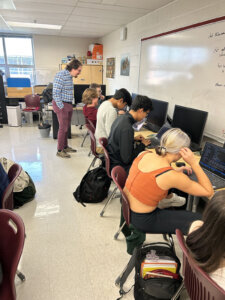
In Room 18 at Thomas Jefferson High School for Science and Technology in Fairfax County, Virginia, teacher Malcolm Eckel watched as his students worked on artificial intelligence for tic tac toe.
In the artificial intelligence course on Friday, which Eckel said is taken by many juniors and seniors with aspirations to study computer science or AI after graduation, students are given an overview of the AI field.
The course doesn’t involve traditional homework or tests, but instead features open-ended projects that students work on for weeks.
For assignments, the goal is to have students work on coding for two or three weeks at a time.
“We really want them to be developing the skill of being a totally independent problem solver with coding by the end of the year,” Eckel said.
The course has evolved with technology, but has been offered to students at the prestigious school for years, Eckel said.
During Friday’s class, Eckel spent a few minutes discussing the task at hand before students opened their laptops and started to code. Every unit, he said, comes with a “centerpiece problem that is related to an actual real life puzzle or problem or brain teaser or scenario of some kind.”
Currently, students are writing artificial intelligence to play the board game Othello. The AI the students produce will be able to beat “just about any human at the game,” Eckel said.
In the last unit, the goal was to use AI to solve 100 sudoku puzzles in less than a second.
In many instances, responses are unique to each individual student, Eckel said, one of the benefits of open-ended problems.
About 40% of students at TJ take the AI class, Eckel said.
Student Anika Saraf described the AI course as one of the best offered at the high school, largely because of the problem-solving skills students develop. The skills students learn can be applied to nonacademic concepts, such as furnishing a home and determining possibilities for different rooms.
“We get a lot of these huge problems that we ourselves have to come up with a methodology to solve it,” Saraf said.
Sophia Huang said AI can be valuable in the context of navigation, too.
“In our games, we’re making (ways to) find the shortest path to a solution,” Huang said. “And, for example, in GPS, you’re finding the shortest path to your location.”
Toward the end of the year, students will write a neural network from scratch, Eckel said. It’ll be able to train itself to recognize handwritten numbers.
“I want them to feel and to genuinely be empowered to write something new,” Eckel said.
Eckel said he wants students to experiment with using AI, pointing out that new innovations sometimes create public concern.
“People’s worries about this are pretty overblown,” Eckel said. “When the pocket calculator was invented, that didn’t make math teaching impossible. And it didn’t make math teaching unnecessary, either. And Chat GPT is not going to make teaching anything impossible, or unnecessary.”
Junior Aarush Vinod said the benefits of AI outweigh the risks, pointing to the way it’s being used in medicine.
Eckel, meanwhile, anticipates the tech will become commonly used, similar to the way people are now using Google searches.
The programs, he said, aren’t “having new ideas, they’re just remixing the things they’re trained on.”
“I don’t think we’ve made it to Skynet yet,” he said.







